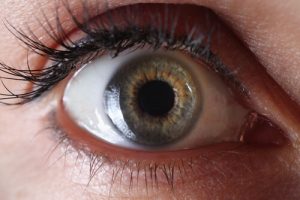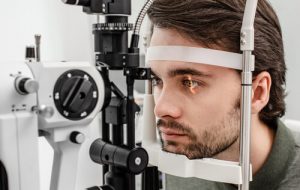In the intricate and often perplexing world of ocular health, the sudden appearance of black spots in one’s vision, distinct from the commonly known floaters, can be a source of considerable concern and intrigue. These visual disturbances, manifesting as dark spots or shadows in one’s field of vision, prompt a flurry of questions and a quest for understanding. Unlike the typical floaters, many experience benign, drifting shapes. These sudden black spots often signify a different, potentially more serious underlying issue.
This article delves into sudden black spots in vision, not floaters, exploring the causes, implications, and the importance of distinguishing them from the usual visual floaters. Join us as we uncover the mysteries behind these visual anomalies, understanding their significance in eye health and the urgency they may demand in certain medical treatment scenarios.
What causes sudden black spots in vision

The sudden emergence of black spots in one’s vision, distinct from the common eye floaters, can be an alarming experience, often signaling underlying ocular issues. These black spots, appearing abruptly in the visual field, can vary in size and shape and might indicate a range of eye conditions, some requiring immediate medical attention.
Understanding the causes of these sudden black spots is crucial for prompt and appropriate treatment. This exploration will explore the various medical conditions that can manifest as black spots in vision, providing insights into their potential implications for eye health.
Causes of Sudden Black Spots in Vision:
- Diabetic Retinopathy: If you’re dealing with diabetes, keep an eye out for diabetic retinopathy—it can make blood vessels in your eyes leak, leading to those ominous dark spots.
- Retinal Detachment or Tear: A serious condition where the retina pulls away from its normal position, causing dark spots or shadows in the vision.
- Macular Degeneration: Age-related macular degeneration, whether it’s the dry or wet type, can cast dark spots on your central vision, creating a blurry scene.
- Ocular Migraines: Sometimes, migraines play tricks on your eyes, causing temporary disturbances like black spots or flashes of light.
- Central Serous Chorioretinopathy: When fluid pools under your retina, it can create dark spots in your vision—a condition known as central serous chorioretinopathy.
- Eye Injuries: Any traumatic encounter with your eye can leave its mark, resulting in the sudden appearance of black spots due to bleeding or tissue damage.
- High Blood Pressure: The silent foe, high blood pressure, can lead to retinal damage, manifesting as those unwelcome dark spots in your field of vision.
- Posterior Uveitis: Inflammation in the layers at the back of your eye, termed posterior uveitis, might bring along dark spots and a bit of vision fuzziness.
- Other Eye Conditions: Whether it’s high myopia or complications from eye surgery, various eye conditions can contribute to the mysterious arrival of black spots in your vision.
Don’t brush off a sudden increase in black spots in your vision—they could be signals of different eye conditions, some of which might lead to permanent vision loss if not handled promptly. If these spots come out of nowhere, especially with buddies like flashes of light or vision loss, don’t wait. Reach out to a medical professional. A precise diagnosis from an eye doctor is the key to effective treatment and safeguarding your vision. Detecting and tackling the underlying causes early on can be your shield against further damage and a way to preserve your precious eyesight.
Other symptoms associated with Sudden Black Spots in Vision
When sudden black spots in the vision bring friends along, it’s like a symphony of symptoms hinting at the seriousness of the underlying eye condition. Recognizing these cues is your ticket to understanding the urgency of seeking medical care. Conditions like retinal detachment or more severe forms of macular degeneration can be vision snatchers if not dealt with promptly.
Other Symptoms Associated with Sudden Black Spots in Vision:
- Flashes of Light: Watch out for sudden flashes or streaks of light—they could hint at retinal detachment or tears, adding drama to the dark spots.
- Vision Loss: Partial or complete vision loss is a serious flag, especially in one eye. It often marches hand in hand with retinal detachment or the heavyweight forms of macular degeneration.
- Blurred Vision: When things get a bit hazy, think about conditions like diabetic retinopathy or macular degeneration—they might be playing tricks on your sight.
- Distorted Vision: If straight lines start to appear in your vision, blame it on macular degeneration. It’s a classic move associated with this eye condition.
- Eye Pain or Discomfort: While not the most common guest, some conditions causing black spots might also bring a bit of eye pain or discomfort.
- Light Sensitivity: If the lights start feeling too bright, it might be a signal from your eyes. Conditions like uveitis or retinal detachment could be pulling the strings.
- Headache: Sometimes, ocular migraines join the party, bringing a pounding headache to accompany those sudden black spots.
- Seeing a Curtain or Veil: If you sense a curtain or dark veil trying to steal the spotlight in your visual field, it’s a classic sign of retinal detachment—like a stage drama playing out in your eye.
- Change in Color Perception: Are the colors losing their sparkle? Conditions affecting the macula, like macular degeneration, might be staging a color coup.
- Eye Floaters: Keep an eye out for an increase in the fleet of floaters—those tiny shadows drifting around. They could be signaling a retinal tear or detachment, creating a bit of a visual spectacle.
If you find sudden black spots in your vision making an entrance with any of these additional symptoms, don’t wait—grab that medical attention. Early diagnosis and treatment are your allies in preserving vision and keeping those eyes in top-notch shape.
Best treatment options for Sudden Black Spots in Vision

The appearance of sudden black spots in vision can be problematic, and understanding the best treatment options is crucial for effectively addressing this symptom. These black spots can stem from various eye conditions requiring a specific treatment approach. The treatment choice depends on the underlying cause, ranging from relatively benign to more serious ocular conditions.
A thorough assessment by an eye care professional is essential to determine the appropriate course of action. This discussion will explore the most effective treatment options for sudden black spots in vision, emphasizing the importance of personalized care and prompt intervention.
Best Treatment Options for Sudden Black Spots in Vision:
- Medical Evaluation: The first step in treatment is a comprehensive eye exam to determine the cause of the black spots.
- Retinal Tears or Detachment: If caused by a retinal tear or detachment, treatments may include laser therapy or surgical procedures like a vitrectomy to repair the retina.
- Diabetic Retinopathy: For black spots caused by diabetic retinopathy, controlling blood sugar levels and specific treatments like laser photocoagulation or anti-VEGF injections are crucial.
- Macular Degeneration: Treatment options include anti-VEGF injections, laser therapy, and lifestyle modifications like dietary changes and vitamin supplements.
- Ocular Migraines: These often require no specific treatment, but managing stress and avoiding migraine triggers are important.
- Vitreous Hemorrhage: If it’s a vitreous hemorrhage stealing the spotlight, the treatment route depends on the severity. It might be a simple observation affair, or surgical intervention could take the stage.
- Inflammatory Conditions: When inflammation is the culprit, expect prescriptions to be written. Corticosteroids and other anti-inflammatory medications might be the heroes in this tale, battling the black spots.
- Lifestyle Adjustments: Sometimes, the little things make a big difference. Adjusting your lifestyle playbook—cutting screen time, improving the lighting, or getting that perfect eyeglass prescription—can be subtle but effective tweaks to the storyline.
- Regular Monitoring: Ongoing monitoring is crucial for conditions like macular degeneration or diabetic retinopathy to track changes and adjust treatment as needed.
The treatment of sudden black spots in vision highly depends on the underlying cause. Early detection and treatment are vital in many patients managing these conditions effectively and preventing potential complications. If you experience sudden black spots in your vision, seeking prompt medical evaluation is essential to determine the appropriate treatment strategy. With the right approach, many conditions causing these spots can be managed successfully, preserving vision and eye health.
Conclusion
Dealing with sudden black spots in vision that are not floaters necessitates prompt medical attention to identify and treat the underlying cause. These spots indicate various serious eye disease conditions and should not be overlooked. Early diagnosis and appropriate treatment are crucial for effectively preserving vision and addressing potential eye health issues. If you notice sudden black spots in your vision, it’s important to consult an eye care professional immediately. Timely action is key to safeguarding your eye health and ensuring the best possible outcomes.
References
Black Spots in Vision: Causes and When to See a Doctor
https://www.verywellhealth.com/black-spots-in-vision-5212791
A Sudden Burst of Black Spots in My Eye: A Threat to My Sight
https://www.washingtonpost.com/national/health-science/a-sudden-burst-of-black-spots-in-my-eye-turned-out-to-be-a-threat-to-my-sight/2013/05/20/cde9b444-adb8-11e2-98ef-d1072ed3cc27_story.html
Floaters and Flashes in the Eyes
https://www.nhs.uk/conditions/floaters-and-flashes-in-the-eyes/
Scotoma: Cleveland Clinic
https://my.clevelandclinic.org/health/diseases/24687-scotoma
Black Dots in Vision Leading to Uveitis
https://www.uchealth.org/today/black-dots-in-vision-lead-to-uveitis/

